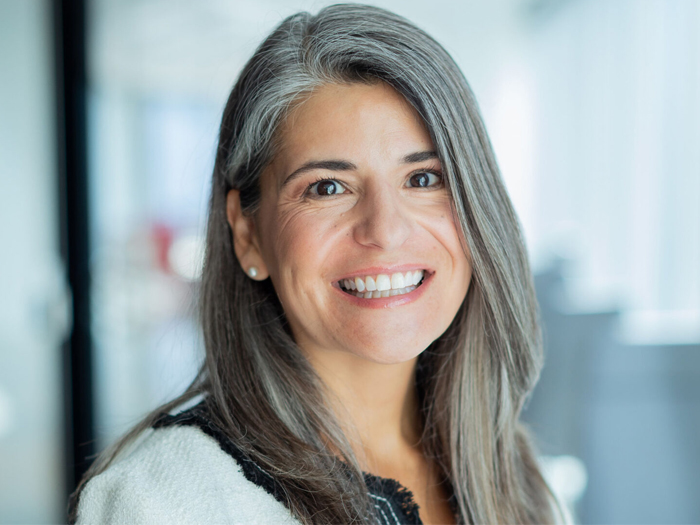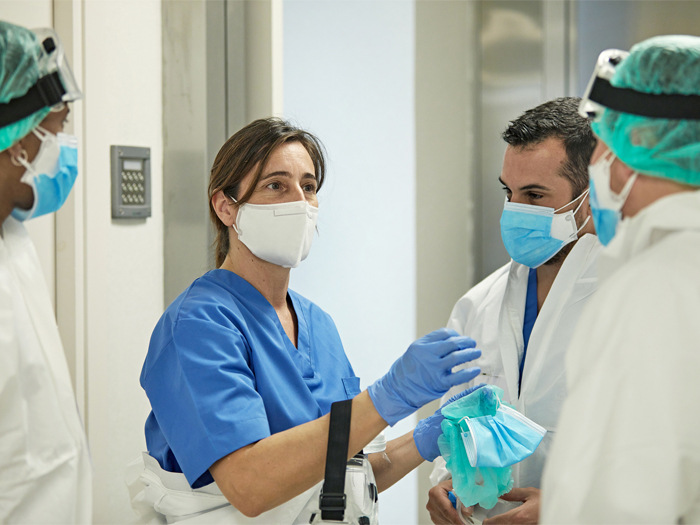7 Questions for Nationwide’s Kristina Talkowski

Risk & Insurance recently sat down with Kristina Talkowski, senior vice president of middle market commercial lines at Nationwide. What follows is a transcript of that conversation, edited for length and clarity.
Risk & Insurance: How did you first get into insurance?
Kristina Talkowski: I attended the University of Wisconsin Business School. As part of the BBA program you had to complete the introduction to risk management, and I was hooked.
This caused me to change my major to risk management and insurance and drop my second major so I could take more risk management classes. What drew me to it was the combination of using analytical skills, married with legal concepts and math, but yet it allowed for creativity because risk always evolves.
However, what really spoke to me was the embedded sense of purpose in risk management. To keep people and assets safe, to be part of an industry that supported all other businesses by protecting them and allowing them to invest, innovate and grow.
R&I: How has your career progressed since?
KT: I started out of college as a middle market underwriter for Liberty Mutual, then briefly worked as a broker — long enough to solidify the fact that I was an underwriter at heart and gain an understanding of how hard it is to be a broker. I returned to middle market underwriting, but at Chubb. This is where I moved into underwriting leadership in 2007—which expanded my responsibility from middle market solely into all commercial underwriting areas.
That experience and the connections I made within that role created the opportunity to progress to a position at CNA in field leadership and also engage in the strategic work CNA was initiating at the time to improve underwriting results through industry specialization.
Prior to leaving CNA to join Nationwide I was leading the middle market industry specialization for underwriting.
R&I: What key qualities will you bring to your new role?
KT: I’m very fortunate to have the experience in my prior roles transitioning portfolios from underperforming to consistently profitable. I saw firsthand the role specialization and deep underwriting skill plays in that transition. Managing through that transition taught me that there is always a path forward and there are no unsolvable insurance problems, but the key is to continue to evolve with the risk environment and clients and be change resilient.
I’m able to translate that prior experience to the current business imperatives for middle market at Nationwide — but also because I’ve experienced this, I can provide confidence, optimism and a future view to the team, knowing the actions they are taking will be successful.
R&I: What has been the biggest challenge you have faced during your career?
KT: My transition from being an underwriter to being a leader. I enjoyed the underwriting role immensely. I felt like myself and the underwriting associate on my team owned our book and our relationships with the agents and brokers. I loved tackling complex accounts, knowing the clients directly and the high degree of ownership, autonomy, and accountability.
My transition to leadership was bumpy and I initially did not like it at all. As a new leader, I tried to be like other leaders I saw instead of being myself. I didn’t know how to lead in a way that provided the autonomy that I would have wanted as an underwriter and yet still trust that I would see results from my team, so I completely micromanaged. And I’m quite sure that first team I managed could give you even more things that were missteps.
However, I was fortunate to have a team that cared enough to provide very balanced and direct feedback. It was hard to hear but critical to altering my approach, and I did appreciate it tremendously.
This helped me understand that leadership was a learned skill like everything else, and something I’d constantly need to keep studying to stay sharp on it. I let go of my perfectionism to some degree (those that know me are laughing right now) and adopted a growth mindset to make a major change in my approach. I read, met with mentors and found the leadership style I aligned with through this.
Now, I see my role as working for my team and being successful by helping others succeed, which completely changed how I listen, interact, set direction and expectations. And it helped me enjoy the business and my role again.
R&I: What has been your biggest achievement to date?
KT: This is tough for me to answer because I don’t really operate looking in the rear-view mirror, other than to learn from experience. And once you move into leadership, nothing is ever ‘your’ achievement because it is done as a collective, and your teams’ achievements are what you benefit from.
I can say what I am most proud of in my career is that I continue to push myself to take on opportunities that present challenges, which allow me to learn and grow my skills while broadening the network I interact with.
No matter how challenging the situation tackled, I feel I’ve done my best to have a positive impact on people and I know I’ve had positive results that materialize in the P&L.
I love that quote from Mother Teresa: “Let no one ever come to you without leaving better and happier.”
And I feel that is true as a leader in business as well to think about how to leave everything better, all the time, for our people and the businesses we have in our care, because that is our employees’ livelihoods, and in insurance, our customers’ asset protection.
R&I: What are the most significant risks currently facing clients in the commercial P&C space?
KT: It varies greatly by industry what risks middle market clients face, which is why specialization is so important to how Nationwide will meet the protection needs of our customers as we go forward in middle market.
Universal to all customers are the unpredictable nature and severity of extreme weather events and how this is impacting their protection needs and their cost of risk. Not only is there higher frequency of severe events, but clients consistently undervalue their property and overestimate how prepared they are to manage through a significant event.
Nationwide recently completed a property protection survey that confirmed this, and we’ve been providing this insight to our agents and brokers to better support their conversations with their customers. The survey also underscored the importance of adequate protection for severe weather as more than one-third of business owners (36%) say their business has experienced damage from a natural disaster and roughly half (49%) say it took four to six months and between $20,000 to $50,000 to recover.
R&I: How will you execute Nationwide’s long-term commercial lines insurance strategy moving forward?
KT: Nationwide has a great origin as a protection company and a customer-focused mission. This gives our middle market team a great direction and sense of purpose to start from. To accomplish our goals, we will lean into that origin and mission to take Nationwide middle market forward by specializing in industries where the customer values industry specific coverage and capabilities. &










